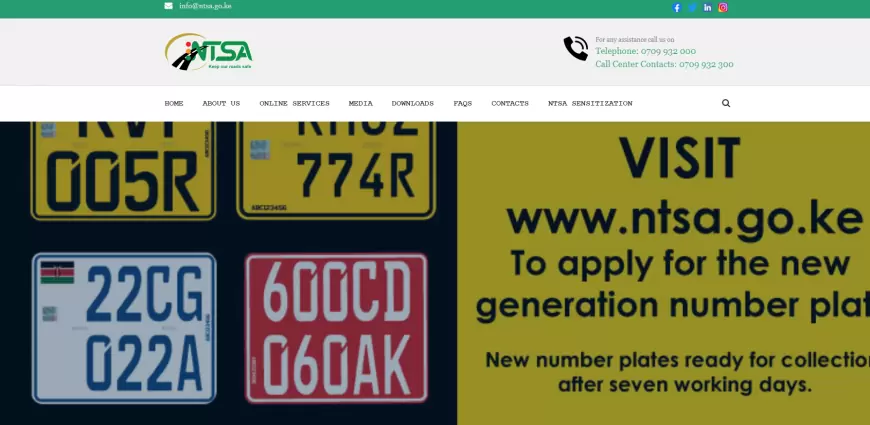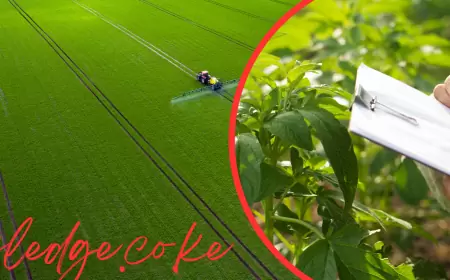New NTSA Charges 2024: A Detailed Guide for Kenyan Motorists
Explore the NTSA Vehicle Inspection Fees Increase and its impact on Kenyan motorists. Get insights, analysis, and practical tips

In a recent startling announcement, Kenya's National Transport and Safety Authority (NTSA) has unveiled plans to increase vehicle registration and inspection fees significantly. This decision has sent ripples across the nation, leaving many Kenyan motorists grappling with the reality of these impending changes. Why this sudden hike in fees? It's a question on the lips of every concerned citizen and stakeholder in the transport sector. The answer lies in the NTSA's push toward achieving financial sustainability and addressing the decade-long stagnation in fee adjustments. Despite the logical reasoning behind this move, the magnitude of the increase has sparked widespread debates and concerns.
Understanding the gravity of this situation, we delve into the specifics of the fee hike, unraveling what it means for the average Kenyan motorist. From private vehicle owners to public transport operators, the impact of this policy shift is far-reaching. For instance, the inspection fees for cars below 3000CC are set to double from KSh1,000 to KSh2,000, while those owning vehicles above 3000CC will witness an even steeper increase. These numbers are not just figures on paper; they represent a significant financial burden for many Kenyans.
But it's not just about the numbers. The implications of this decision extend beyond the pocketbook, touching on aspects of road safety, vehicle maintenance standards, and the overall efficiency of transport services in the country.
READ ALSO: M-PESA Short-Term Paybill- Application Form, Benefits, Requirements, and How to Apply
Detailed Analysis of the Fee Increase
Let's break it down: For vehicles below 3000CC, the inspection fees are set to leap from KSh1,000 to KSh2,000. This 100% increase is significant, especially considering that many Kenyan motorists own cars within this category. But the changes don't stop there. Owners of vehicles with an engine capacity above 3000CC will face an even steeper increase, with fees jumping from KSh1,000 to KSh2,500.
To put these changes into perspective, imagine a scenario where a typical family car, previously incurring a fee of KSh1,000 for its annual inspection, will now require double the amount. This isn't just a slight adjustment; it's a financial hurdle many Kenyan families must overcome. The same goes for larger vehicles, often used for business purposes, which will now incur an additional KSh1,500 for inspection.
Here is a complete analysis of all the fees:
| Service | Current Price (Ksh) | Proposed Price (Ksh) |
|---|---|---|
| Driver Test Booking | 1,000 | 1,000 |
| Instructor Test Booking | 500 | 500 |
| Motorvehicle Inspection Fee for Motorbikes and three-wheelers | None | 500 |
| MV Inspection of vehicles below 3000CC | 1,000 | 2,000 |
| MV Inspection of vehicles above 3000CC | 1,000 | 2,500 |
| Inspection of trailers under 5 tons | 1,000 | 2,000 |
| Inspection of trailers above 5 tons | 1,000 | 2,500 |
| Inspection of HCV under 5 tons | 1,000 | 3,000 |
| Inspection of HCV above 5 tons | 1,000 | 3,500 |
| Inspection of accident vehicles | None | 1,500 |
| MV Inspector License | None | 3,000 |
| Inspector Center License (yearly) | None | 200,000 |
| PSV Badges | 1,000 | 1,500 |
| E-sticker fees | 700 | 700 |
| Normal Number Plate | 3,000 | 5,000 |
| Single Number Plate | 1,500 | 2,500 |
| Application for FMVP vehicles not exceeding 2000CC | 20 Dollars | 50 Dollars |
| Application for FMVP vehicles exceeding 2000CC | 40 Dollars | 100 Dollars |
| Builders License | 9,600 | 100,000 |
| Insurance Integrators | 100 | 100 |
| Speed Limiter | 50,000 | 150,000 |
| Transporter Network Company License | 100,000 | 200,000 |
| 1140506-011 - Tractor Registration | 8,300 | 16,600 |
| 1420201-026 - Asset Finance Discharge Fee | 1,175 | 2,350 |
| 1420201-025 - Asset Finance In scharge Fee | 1,175 | 2,350 |
| Motorvehicle registration below 1001CC | 1,700 | 3,400 |
| Motorvehicle registration 1001-1200CC | 2,100 | 4,200 |
| Motorvehicle registration 1201-1500CC | 2,300 | 4,600 |
| Motorvehicle registration 1501-1700CC | 2,800 | 5,600 |
| Motorvehicle registration 1701-2000CC | 3,300 | 6,600 |
| Motorvehicle registration 2001-2500CC | 5,100 | 10,200 |
| Motorvehicle registration 2501-3000CC | 7,000 | 14,000 |
| Motorvehicle registration above 3001CC | 8,300 | 16,600 |
| Smart Driving Licence | 3,000 | 3,000 |
| Variation of Driving School Licence | 500 | 1,000 |
| Motorcycle registration below 2500CC | 735 | 1,470 |
| Motorcycle registration below 2500CC | 1,100 | 2,200 |
| Provisional driving license | 650 | 650 |
| Application for a driving school licence | 500 | 1,000 |
| Driving License renewal three years | 3,000 | 3,000 |
| Driving class endorsement | 500 | 500 |
| Duplicate driving license | 3,000 | 3,000 |
| Interim driving license | 700 | 700 |
| Driving School License Renewal Class A | 20,000 | 50,000 |
| Driving school license renewal Class B | 15,000 | 20,000 |
| Driving school license renewal Class C | 5,000 | 10,000 |
| Motorvehicle Copy of records | 500 | 500 |
| Duplicate registration Book (Log book) | 2,500 | 10,000 |
| Transfer of ownership of motor vehicle not exceeding 1000CC | 1,660 | 10,000 |
| Transfer of ownership of motor vehicle 1001-1200CC | 1,890 | 3,780 |
| Transfer of ownership of motor vehicle 1201-1500CC | 2,065 | 4,130 |
| Transfer of ownership of motor vehicle 1501-1700CC | 2,410 | 4,820 |
| Transfer of ownership of motor vehicle 1701-2000CC | 2,695 | 5,390 |
| Transfer of ownership of motor vehicle 2001-2500CC | 3,845 | 7,690 |
| Transfer of ownership of motor vehicle 2501-3000CC | 5,055 | 10,110 |
| Transfer of ownership of motor vehicle exceeding 3000CC | 5,915 | 11,830 |
| Conversion of Foreign License | 1,000 | 10,000 |
| Driving License Copy of Record | 500 | 1,000 |
| New Motorvehicle dealers license | 9,600 | 100,000 |
| Second-hand Motorvehicle dealers license | 4,200 | 100,000 |
| Renewal - Second-hand Motorvehicle dealers license | 4,200 | 50,000 |
| Motorvehicle Deregistration | 500 | 1,000 |
| Renewal - New Motorvehicle dealers license | 9,600 | 50,000 |
| Foreigners Driving License Endorsement | 500 | 3,000 |
| Change of particulars colour | 500 | 20,000 |
| Renewal Instructors license | 1,000 | 2,000 |
| Trailer Registration | 2,865 | 5,000 |
The rationale behind this hike is grounded in NTSA's need to increase its revenue stream, which has reportedly remained stagnant for over a decade. The cost of providing these services has increased during this time, but the fees have not, leading to a revenue deficit. The NTSA argues that this increase is essential for efficient and safe transport services.
Impact on Different Vehicle Types
It's important to consider how these changes will affect different types of vehicles. For small car owners, the fee hike might mean tighter budgets and reconsidering vehicle maintenance schedules. For commercial vehicles, especially those with higher engine capacities, the increased costs could translate into higher operating costs, potentially impacting the prices of goods and services.
Broader Impact and Motorist Reactions
Widespread Impact on Kenyan Society
The NTSA's decision doesn't just affect individual car owners; it has far-reaching consequences for the entire transport sector. For public transport operators, the higher costs could mean increased fares to compensate, directly impacting daily commuters. Private vehicle owners, on the other hand, might find themselves postponing or skipping essential vehicle inspections due to the added financial strain.
Voices from the Ground: Stakeholder Reactions
The response from the public and stakeholders has been a mix of concern, frustration, and understanding. Some motorists worry about how these additional expenses will stretch their already tight budgets. Driving schools, facing doubled license review fees, are contemplating how these changes will affect their operating costs and, subsequently, their pricing models. Vehicle dealers, particularly those dealing in secondhand vehicles, are also bracing for the impact of increased licensing fees.
Expert Opinions and NTSA's Justification
To provide a balanced view, we contacted transport experts and NTSA officials. The common thread in their responses is recognizing the need for financial sustainability within the NTSA. However, they also emphasize the importance of considering the economic realities of average Kenyans. NTSA board member Paul Posh reiterated that the fee hike is a long-overdue adjustment, essential for maintaining the quality of transport services in Kenya.
Long-term Effects on the Transport Sector
The increased fees, while aimed at improving NTSA's financial sustainability could lead to several significant shifts in Kenya's transport landscape. There's a possibility of a rise in the number of unregistered or uninspected vehicles on the roads, as some motorists may attempt to circumvent the high costs. This scenario could have implications for road safety and vehicle maintenance standards. Additionally, the transport sector might gradually shift as individuals and businesses adjust to the new financial demands, potentially leading to changes in vehicle ownership trends and public transport dynamics.
Navigating the Changes: Recommendations for Stakeholders
- For Motorists: Plan your finances well for vehicle registration and inspection. Consider setting aside a budget for these increased fees to avoid last-minute financial pressure.
- For Commercial Operators: Explore ways to optimize operations to absorb the increased costs without significantly burdening consumers. This might include better route management or fuel efficiency practices.
- For Driving Schools and Vehicle Dealers: Transparency with customers about the increased costs and their impact on service prices will be key. It may also be an excellent time to reevaluate business models to ensure sustainability.
Alternatives and Solutions
The government and NTSA could explore alternative solutions to mitigate the impact on the populace. Implementing a phased approach to the fee increase or providing subsidies for specific categories of vehicles, such as public service vehicles, could be considered. Additionally, engaging in open dialogues with stakeholders could lead to more inclusive and acceptable solutions.
READ ALSO: KRA Careers Portal: Registration, Requirements ,Jobs and Application Process
FAQs: Addressing Common Questions About NTSA's Fee Hike
What are the new NTSA vehicle inspection fees?
- For vehicles below 3000CC, the inspection fee will be KSh2,000, up from KSh1,000. For vehicles above 3000CC, the fee will increase to KSh2,500.
When will these new fees come into effect?
- NTSA has not provided a specific date to implement these new fees. Keep an eye on official NTSA communications for updates.
Why has NTSA decided to increase these fees?
- The primary reason for the fee hike is to address NTSA's financial sustainability. The fees have remained unchanged for over a decade while the cost of services has increased.
How will this fee increase impact the average motorist?
- Motorists will need to budget more for vehicle-related expenses. This could lead to tighter financial planning, especially for lower-income people.
Are there any exemptions or subsidies available?
- Currently, there are no announced exemptions or subsidies. However, staying updated with NTSA announcements for any changes in this area is advisable.
READ ALSO: NTSA TIMS Portal 2024: Creating TIMS Account, Portal Services, Vehicle Transfer Fees And More
Conclusion
The NTSA's decision to double vehicle registration and inspection fees is a significant move with wide-ranging implications for Kenyan motorists and the transport sector. While it addresses the Authority's need for financial sustainability, it also places an additional financial burden on vehicle owners. As we've explored in this article, understanding the specifics of this fee hike and its broader implications is crucial for effective adaptation.
We hope this article has provided valuable insights into NTSA's policy change and its impact on Kenyan society. As the situation evolves, staying informed and prepared will be vital to navigating these changes successfully.












































































